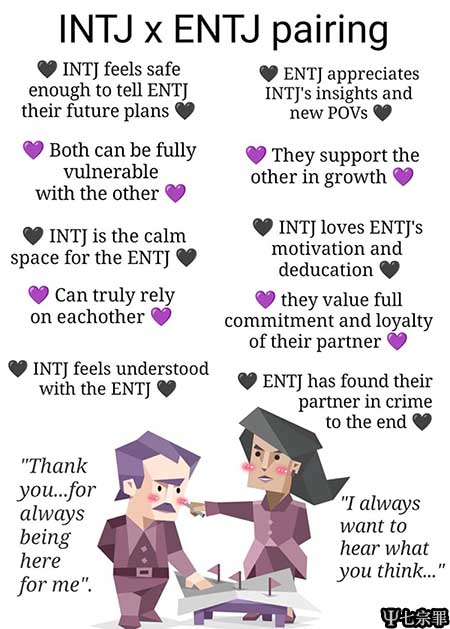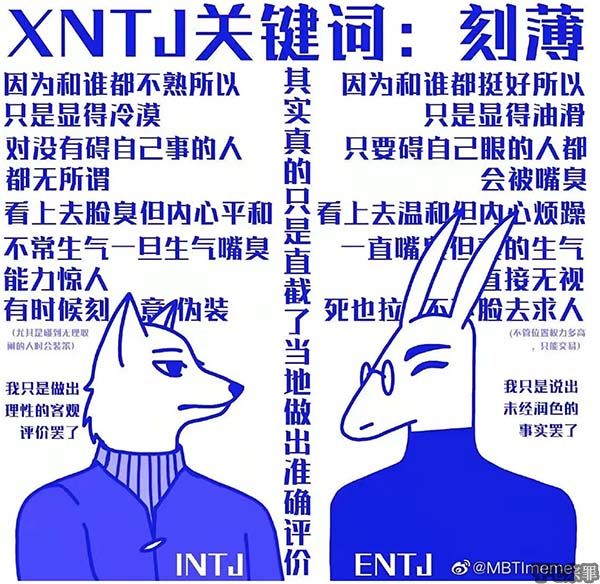良好的秩序是一切的基础。
Good order is the foundation of all things.
埃德蒙·伯克(EDMUND BURKE)
WHO IS AN EXECUTIVE (ESTJ)?
谁是执行官(ESTJ)?
An Executive (ESTJ) is someone with the Extraverted, Observant, Thinking, and Judging personality traits. They possess great fortitude, emphatically following their own sensible judgment. They often serve as a stabilizing force among others, able to offer solid direction amid adversity.

执行官(ESTJ)是具有外向、观察、思考和判断人格特征的人。
他们有很强的毅力,坚决遵循自己的明智判断。
它们通常充当一股稳定的力量,能够在逆境中提供坚实的方向。
Executives are representatives of tradition and order, utilizing their understanding of what is right, wrong and socially acceptable to bring families and communities together. Embracing the values of honesty, dedication and dignity, people with the Executive personality type are valued for their clear advice and guidance, and they happily lead the way on difficult paths. Taking pride in bringing people together, Executives often take on roles as community organizers, working hard to bring everyone together in celebration of cherished local events, or in defense of the traditional values that hold families and communities together.
ESTJ是传统和秩序的代表,利用他们对正确、错误和社会可接受的理解范围,将家庭和社区团结在一起。
拥有诚实、奉献和尊严的价值观,具有行政人格类型的人因其明确的建议和指导而受到重视,他们乐于在艰难的道路上引领潮流。
ESTJ们以将人们聚集在一起而自豪,他们经常担任社区组织者的角色,努力将每个人聚集在一起,庆祝当地的珍贵活动,或捍卫将家庭和社区团结在一起的传统价值观。
Anyone Worth Their Salt Sticks Up for What They Believe Is Right…
任何值得信赖的人都会坚持他们认为正确的事情……
Demand for such leadership is high in democratic societies, and forming no less than 11% of the population, it’s no wonder that many of America’s presidents have been Executives. Strong believers in the rule of law and authority that must be earned, Executive personalities lead by example, demonstrating dedication and purposeful honesty, and an utter rejection of laziness and cheating, especially in work. If anyone declares hard, manual work to be an excellent way to build character, it is Executives.
民主社会对这种领导力的需求很高,占人口的比例不少于 11%,难怪美国的许多总统都是ESTJ。
坚信必须赢得的法治和权威,执行人员以身作则,表现出奉献精神和有目的的诚实,并且完全拒绝懒惰和作弊,尤其是在工作中。
如果有人宣称艰苦的体力劳动是塑造品格的好方法,那就是ESTJ。
Executives are aware of their surroundings and live in a world of clear, verifiable facts – the surety of their knowledge means that even against heavy resistance, they stick to their principles and push an unclouded vision of what is and is not acceptable. Their opinions aren’t just empty talk either, as Executives are more than willing to dive into the most challenging projects, improving action plans and sorting details along the way, making even the most complicated tasks seem easy and approachable.
ESTJ们了解他们的周围环境,生活在一个清晰、可验证的事实的世界中——他们知识的保证意味着即使面对巨大的阻力,他们也会坚持自己的原则,并推动对什么是可接受的和不可接受的事情的清晰愿景。
他们的意见也不仅仅是空谈,因为ESTJ们更愿意潜入最具挑战性的项目,改进行动计划并在此过程中整理细节,即使是最复杂的任务也看起来容易平易近人。
However, Executives don’t work alone, and they expect their reliability and work ethic to be reciprocated – people with this personality type meet their promises, and if partners or subordinates jeopardize them through incompetence or laziness, or worse still, dishonesty, they do not hesitate to show their wrath. This can earn them a reputation for inflexibility, a trait shared by all Sentinel personalities, but it’s not because Executives are arbitrarily stubborn, but because they truly believe that these values are what make society work.
然而,ESTJ们不会独自工作,他们希望自己的可靠性和职业道德得到回报——具有这种性格类型的人会兑现他们的承诺,如果合作伙伴或下属因无能或懒惰,或者更糟糕的是不诚实而危及他们,他们会这样做毫不犹豫地表现出他们的愤怒。
这可以为他们赢得不灵活的名声,这是所有 Sentinel 人物共有的特征,但这并不是因为ESTJ们武断固执,而是因为他们真正相信这些价值观是社会运转的原因。
…But Still Better Are Those Who Acknowledge When They Are in ErrorExecutives are classic images of the model citizen: they help their neighbors, uphold the law, and try to make sure that everyone participates in the communities and organizations they hold so dear.
…
但更好的是那些在错误时承认的人ESTJ是模范公民的经典形象:他们帮助邻居,维护法律,并努力确保每个人都参与到他们所珍视的社区和组织中。
The main challenge for Executives is to recognize that not everyone follows the same path or contributes in the same way. A true leader recognizes the strength of the individual, as well as that of the group, and helps bring those individuals’ ideas to the table. That way, Executives really do have all the facts, and are able to lead the charge in directions that work for everyone.
ESTJ面临的主要挑战是认识到并非每个人都遵循相同的道路或以相同的方式做出贡献。
真正的领导者会认识到个人以及团队的力量,并帮助将个人的想法带到桌面上。
这样一来,ESTJ们就真的掌握了所有的事实,并且能够领导对每个人都有效的方向。
Strengths & Weaknesses
优势与劣势
优
优势的ESTJ
(Executive Strengths)
Dedicated – Seeing things to completion borders on an ethical obligation for Executives. Tasks aren’t simply abandoned because they’ve become difficult or boring – people with the Executive personality type take them up when they are the right thing to do, and they will be finished so long as they remain the right thing to do.
敬业——看到事情完成几乎是ESTJ的道德义务。
任务不会因为变得困难或无聊而简单地被放弃——具有执行型人格类型的人会在它们是正确的事情时接受它们,只要它们仍然是正确的事情,它们就会完成。
Strong-willed – A strong will makes this dedication possible, and Executives don’t give up their beliefs because of simple opposition. Executives defend their ideas and principles relentlessly, and must be proven clearly and conclusively wrong for their stance to budge.
意志坚强——坚强的意志使这种奉献成为可能,ESTJ不会因为简单的反对而放弃自己的信念。
ESTJ们坚持不懈地捍卫他们的想法和原则,并且必须清楚地证明他们的立场是错误的,他们的立场才能让步。
Direct and Honest – Executives trust facts far more than abstract ideas or opinions. Straightforward statements and information are king, and Executive personalities return the honesty (whether it’s wanted or not).
直接和诚实——ESTJ信任事实远胜于抽象的想法或观点。
直截了当的陈述和信息是王道,而ESTJ则以诚实作为回报(无论是否需要)。
Loyal, Patient and Reliable – Executives work to exemplify truthfulness and reliability, considering stability and security very important. When Executives say they’ll do something, they keep their word, making them very responsible members of their families, companies and communities.
忠诚、耐心和可靠——ESTJ们努力体现真实性和可靠性,认为稳定性和安全性非常重要。
当ESTJ们说他们会做某事时,他们会信守诺言,使他们成为家庭、公司和社区中非常负责任的成员。
Enjoy Creating Order – Chaos makes things unpredictable, and unpredictable things can’t be trusted when they are needed most – with this in mind, Executives strive to create order and security in their environments by establishing rules, structures and clear roles.
享受创造秩序的乐趣——混乱使事情变得不可预测,而不可预测的事情在最需要的时候是不可信的
考虑到这一点,ESTJ们通过建立规则、结构和明确的角色来努力在他们的环境中创造秩序和安全。
Excellent Organizers – This commitment to truth and clear standards makes Executives capable and confident leaders. People with this personality type have no problem distributing tasks and responsibilities to others fairly and objectively, making them excellent administrators.
优秀的组织者——这种对真理和明确标准的承诺使ESTJ们成为有能力和自信的领导者。
具有这种性格类型的人可以公平客观地将任务和责任分配给他人,使他们成为优秀的管理者。
弱
弱势的ESTJ
(Executive Weaknesses)
Inflexible and Stubborn – The problem with being so fixated on what works is that Executives too often dismiss what might work better. Everything is opinion until proven, and Executive personalities are reluctant to trust an opinion long enough for it to have that chance.
不灵活和固执——如此执着于行之有效的问题是,ESTJ们常常忽视可能更有效的方法。
在得到证实之前,一切都是意见,ESTJ人格类型不太有机会情愿愿长期相信一个观点。
Uncomfortable with Unconventional Situations – Executives are strong adherents to tradition and when suddenly forced to try unvetted solutions, they become uncomfortable and stressed. New ideas suggest that their methods weren’t good enough, and abandoning what has always worked before in favor of something that may yet fail risks their image of reliability.
对非常规情况感到不舒服——ESTJ们是传统的坚定拥护者,当突然被迫尝试未经审查的解决方案时,他们会变得不舒服和压力大。
新想法表明他们的方法不够好,放弃以前一直有效的方法,转而采用可能失败的方法,这会危及他们的可靠性形象。
Judgmental – Executives have strong convictions about what is right, wrong, and socially acceptable. Executives’ compulsion to create order often extends to all things and everyone, ignoring the possibility that there are two right ways to get things done. Executives do not hesitate to let these “deviants” know what they think, considering it their duty to set things right.
判断性——ESTJ对什么是对、错和社会可接受的有强烈的信念。
ESTJ们创造秩序的冲动往往延伸到所有事物和每个人,而忽略了完成事情有两种正确方法的可能性。
ESTJ们毫不犹豫地让这些“离经叛道者”知道ESTJ的想法,认为他们有责任把事情做好。
Too Focused on Social Status – Executives take pride in the respect of their friends, colleagues and community and while difficult to admit, are very concerned with public opinion. Executives (especially Turbulent ones) can get so caught up in meeting others’ expectations that they fail to address their own needs.
过于关注社会地位——ESTJ们以尊重他们的朋友、同事和社区为荣,虽然很难承认,但他们非常关心公众舆论。
管理人员(尤其是动荡型管理人员)可能会过于专注于满足他人的期望,以至于无法满足自己的需求。
Difficult to Relax – This need for respect fosters a need to maintain their dignity, which can make it difficult to cut loose and relax for risk of looking the fool, even in good fun.
难以放松——这种对尊重的需要促进了他们维护尊严的需要,这使得即使在乐趣中也很难放松和放松,以免看起来很傻。
Difficulty Expressing Emotion – This is all evidence of Executives’ greatest weakness: expressing emotions and feeling empathy. People with the Executive personality type get so caught up in the facts and most effective methods that they forget to think of what makes others happy, or of their sensitivity. A detour can be breathtakingly beautiful, a joy for the family, but Executives may only see the consequence of arriving at their destination an hour late, hurting their loved ones by rejecting the notion too harshly.
难以表达情感——这是ESTJ最大弱点的所有证据:表达情感和感受同理心。
具有执行型人格类型的人如此沉迷于事实和最有效的方法,以至于他们忘记了思考什么让别人快乐,或者他们的敏感性。
迂回的可以美得令人窒息,对家人来说是一种快乐,但ESTJ们可能只会看到迟到一个小时到达目的地的后果,过于严厉地拒绝这个想法会伤害到他们所爱的人。
Romantic Relationships
浪漫关系
Executives are fairly unique in that their relationships don’t really change as they progress from the dating phase into more steady, long-term relationships and further into marriage. Because they value honesty and straightforwardness so highly, people with the Executive personality type are likely to be clear about who they are, what they’re like and what their goals are from the start, and to stick to those statements long-term. So long as their partner is able to take them at their word and follow suit, they are bound to be extremely stable relationships.
ESTJ们相当独特,因为他们的关系并没有真正改变,因为他们从约会阶段进入更稳定、长期的关系并进一步进入婚姻。
因为他们非常重视诚实和直率,具有执行人格类型的人可能从一开始就清楚自己是谁、他们喜欢什么以及他们的目标是什么,并长期坚持这些陈述。
只要他们的伴侣能够相信他们的话并效仿,他们的关系就一定会非常稳定。
This Is the Chance to Do Something
这是做某事的机会
This isn’t to say that there isn’t any growth of course – character development is always a high priority for Executives, and each life goal is important. Rather, it’s that shifting moods, goals and desires are unlikely to fundamentally alter the basis of Executives’ relationships.
当然,这并不是说没有任何成长——性格发展始终是ESTJ的重中之重,每个人生目标都很重要。
相反,情绪、目标和愿望的变化不太可能从根本上改变ESTJ恋爱的基础。
There are certainly challenges, but Executives take their relationships seriously and are willing to put a tremendous amount of effort into ensuring that they remain strong and committed, and that effort pays off.
当然存在挑战,但ESTJ们会认真对待他们的关系,并愿意付出巨大的努力来确保他们保持坚强和忠诚,并且这种努力会得到回报。
This may all sound a little stale, and indeed Executives are not spontaneous or unpredictable people, but they do very much enjoy taking their partners out and having fun. Social events and activities are Executives’ idea of a good time, and while they may rely on familiar people and places, they do bring lots of energy and enthusiasm, which helps keep things interesting.
这听起来可能有点陈旧,实际上ESTJ们不是自发或不可预测的人,但他们确实非常喜欢带他们的合作伙伴出去玩。
社交事件和活动是ESTJ们对美好时光的想法,虽然他们可能依赖熟悉的人和地方,但它们确实带来了很多能量和热情,这有助于让事情变得有趣。
Executives approach intimacy with similarly physical, active intentions, and from fairly traditional ones as well. Wild ideas and poetry are for less mature personalities, or so Executives might say, though they do appreciate recognition and well-placed compliments to maintain high self-esteem. They may look for more stability in their sex lives than most, but Executives never fail to bring their characteristic vigor.
ESTJ们以相似的身体活动、积极的意图以及相当传统的意图来保持亲密关系。
狂野的想法和诗歌适合不太成熟的人,或者ESTJ们可能会这样说,尽管他们确实欣赏认可和恰当的赞美以保持高度的自尊心。
他们可能比大多数人更希望自己的性生活更稳定,但ESTJ们总是能带来他们特有的活力。
This hints at a challenge in Executives’ relationships though, and that is emotional intimacy. Touchy-feely moments are few, as are verbal statements of love; this is usually fine, as Executive personalities find other, more tangible ways to express their affection. The problem is in recognizing the validity of those qualities in others, rather than simply dismissing them as pointless or irrational, something that can be extremely hurtful if Executives’ partners are more sensitive.
不过,这暗示了ESTJ关系中的挑战,那就是情感亲密关系。
敏感的时刻很少,爱的口头陈述也是如此。
这通常很好,因为ESTJ人员会找到其他更切实的方式来表达他们的感情。
问题在于认识到这些品质在他人身上的有效性,而不是简单地认为它们毫无意义或不合理,如果ESTJ的合作伙伴更加敏感,这可能会造成极大的伤害。
Pay the Price to Secure the Blessing
付出代价来获得祝福
Executives address conflict head-on with simple statements of fact – a very rational approach – but subtlety and emotional tact are sacrificed in the process. While Executives’ level-headed, calm approach is appreciated by many, for others it is an uncomfortably direct approach. For all their social skills, Executives are especially bad at reading the emotional side of other people, and when it comes to their partners, it’s more important than ever to try to improve.
ESTJ们用简单的事实陈述来正面解决冲突——这是一种非常理性的方法——但在这个过程中会牺牲微妙和情感上的机智。
尽管许多人赞赏ESTJ们头脑冷静及冷静的方式,但对其他人来说,这是一种令人不舒服的直接方法。
尽管拥有所有社交技能,ESTJ们尤其不擅长解读他人的情感方面,而对于他们的合作伙伴来说,尝试改进比以往任何时候都更重要。
Executives are people of strong principles and strong self-confidence. They use these qualities to protect their partners with admirable consistency. But people with the Executive personality type are also stubborn, with a firm belief in their rightness, and they can quickly damage more sensitive partners’ fragile feelings. With this in mind, it is often best for Executives to find fellow Observant (S) partners in order to minimize communication barriers, with one or two opposing traits to balance their forceful character and provide opportunities for growth.
ESTJ是具有强烈原则和强烈自信的人。
他们利用这些品质以令人钦佩的一致性来保护他们的合作伙伴。
但执行型人格类型的人也很固执,坚信自己的正确性,他们会迅速伤害更敏感的伴侣脆弱的感情。
考虑到这一点,ESTJ们通常最好找到观察力 (S) 的伙伴,以最大程度地减少沟通障碍,用一两个相反的特征来平衡他们强大的性格并提供成长机会。
Friendships
友谊
Executives are strong, traditional friends who appreciate loyalty and shared values. Friendships with the Executive personality type are often defined by their mutual activities and routines, by external factors, more so than the sense of intellectual or mystical compatibility that many Analyst and Diplomat personalities share among themselves. But this in no way diminishes the relationships – Executives’ friendships of dependability and mutual interest can be powerful connections that endure life’s changes with immutable constancy.
ESTJ们是强大的传统朋友,他们欣赏忠诚和共同的价值观。
与ESTJ人格类型的友谊通常由他们的共同活动和惯例以及外部因素来定义,而不是许多分析师和外交官之间共享的智力或神秘的兼容性。
但这绝不会削弱这种关系——ESTJ们的可靠友谊和共同利益可以成为强大的联系,以不变的恒常性承受生活的变化。
There Is No Pleasure in Having Nothing to Do…
无事可做是没有乐趣的……
Among their established friends, Executives show themselves to be outgoing and enthusiastic, always more than happy to bring others along for some healthy sport and outdoor activity. Executives sometimes get a little overbearing in their push for participation, but it’s just because they want everyone to have a good time. Executives’ friends are never short on invites to social activities and events, from tickets to a local ball game, to a weekend camping trip, to Sunday BBQ.
在他们的老朋友中,ESTJ们表现出外向和热情,总是非常乐意带其他人一起参加一些健康的运动和户外活动。
ESTJ们在推动参与时有时会有点霸道,但这只是因为他们希望每个人都玩得开心。
ESTJ的朋友从不缺社交活动和活动的邀请,从当地球赛的门票到周末露营之旅,再到周日烧烤。
Executives seek strong friendships founded on trust and loyalty (though loyalty to family does come first). Active and with quick minds, people with the Executive personality type can’t ever be accused of not doing enough to fend off a little boredom. While Executives may not always be the life of the party, they know how to play their part in making sure their friends have a good time.
ESTJ们寻求建立在信任和忠诚基础上的牢固友谊(尽管对家庭的忠诚确实是第一位的)。
具有ESTJ人格类型的人积极且思维敏捷,永远不会被指责没有做足够的事情来摆脱一点无聊。
虽然ESTJ可能并不总是聚会的主角,但他们知道如何发挥自己的作用,确保他们的朋友玩得开心。
The way Executives establish and maintain their friendships does limit the pool though, as they tend to seek out people who are similar to themselves, who share their respect for traditions and institutions. Executive personalities are naturally stubborn, and it can be hard for them to find enough common ground with people who constantly disagree with their principles and beliefs to really form those ties of friendship.
不过,ESTJ们建立和维持友谊的方式确实限制了人才库,因为他们倾向于寻找与自己相似的人,他们分享对传统和制度的尊重。
ESTJ性格天生固执,他们很难与那些不断不同意他们的原则和信仰的人找到足够的共同点,从而真正形成这种友谊纽带。
…The Fun Is in Having Lots to Do and Not Doing It
…乐趣在于有很多事情要做和不做
Executives’ challenge in friendship isn’t about finding fun things to do or people to do them with, but in finding diversity in their friends and activities. For all their community participation, Executives struggle immensely in even fully listening to differing opinions, let alone befriending people who consistently express alternate viewpoints. Whether about local political issues or the validity of a more emotional, idealistic disposition than they think is reasonable, Executives should make an effort to truly understand these alternate viewpoints.
ESTJ们在友谊方面面临的挑战不是要找到有趣的事情来做或找人一起做,而是要在他们的朋友和活动中找到多样性。
对于他们所有的社区活动参与,ESTJ们甚至在充分听取不同意见方面都付出了巨大的努力,更不用说与始终表达不同观点的人交朋友了。
无论是关于当地政治问题,还是比他们认为合理的更情绪化、更理想主义的倾向的有效性,ESTJ们都应该努力真正理解这些不同的观点。
Simply put, it’s healthy for Executives to have some loyal opposition.
简而言之,对于ESTJ来说,有一些忠诚的反对者是健康的。
Exposing themselves to new ideas among acquaintances who think differently can do no harm – either people with the Executive personality type discover better ways and a stronger foundation, or they gain all the more confidence in their beliefs for having successfully defended them. Just as Executives may think those loners who spend their lives in their basements playing video games need to get out more, Executives themselves need to make sure they get out of their own bubbles of unchallenged opinions and beliefs.
让自己接触不同想法的熟人之间的新想法不会造成任何伤害——要么具有执行型人格类型的人发现更好的方法和更强大的基础,要么他们对自己成功捍卫自己的信念更有信心。
正如ESTJ们可能认为那些在地下室玩电子游戏的孤独者需要更多地出去一样,ESTJ们自己也需要确保他们摆脱自己不受挑战的观点和信念的泡沫。
Parenthood
为人父母
Executives’ mantra of “hard work, tradition, respect” is best exemplified in their relationships with their children. In many ways, people with the Executive personality type are the classic 50’s era father figure – very strict, and guardians of family traditions who have no trouble when it comes to enforcing the rules and standards they’ve established. Often seen as model citizens, Executives expect their children to carry that image, continuing the example they’ve set by being polite and respectful – insubordination is not tolerated.
ESTJ们“努力工作、传统、尊重”的口号在他们与孩子的关系中得到了最好的体现。
在许多方面,具有ESTJ人格类型的人都是 50 年代经典的父亲形象——非常严格,是家庭传统的守护者,在执行他们制定的规则和标准时没有任何问题。
ESTJ们通常被视为模范公民,他们希望他们的孩子能够树立这样的形象,继续他们通过礼貌和尊重树立的榜样——不服从是不能容忍的。
Executives have a very responsibility-oriented life-view, a firm belief in the idea that one does what one can do in order to contribute to the family and community.
ESTJ有一种非常以责任为导向的人生观,坚信人尽其所能为家庭和社区做出贡献的理念。
This view is of course extended to their children, and as soon as they are able, their children are expected to contribute in their own way, by cleaning their plates and their rooms and going to bed on time – by maintaining the order of things.
这种观点当然也适用于他们的孩子,只要他们有能力,他们的孩子就会以自己的方式做出贡献,打扫他们的盘子和房间,按时上床睡觉——通过维持事物的秩序。
This inflexibility can become a challenge as their children grow into their more naturally rebellious adolescent years. Executives defend their own, and their relationships with their children are no different, but they expect their children to adhere to the structures they’ve put in place to ensure that protection. Executives enjoy creating secure, stable environments, and consider it an affront to have those considerations rejected – again, insubordination is not tolerated.
随着他们的孩子成长为更自然叛逆的青春期,这种不灵活可能会成为一个挑战。
ESTJ们为他们自己辩护,他们与孩子的关系也不例外,但他们希望他们的孩子遵守他们为确保保护而建立的结构。
ESTJ们喜欢创造安全、稳定的环境,并认为拒绝这些考虑是一种侮辱——同样,不服从是不能容忍的。
It’s not that they have wild, high-flying hopes of perfection for their children – Executives are down-to-earth people and simply want to see their children develop into respected, responsible adults. But Executive personalities also want their children to be strong-willed and capable, and that is something that can only happen when they have the chance to make their own decisions, and the chance to face the consequences of those decisions, good or bad, with the love and support of their parents.
并不是说他们对孩子的完美抱有狂野而高远的希望——ESTJ们是脚踏实地的人,只是希望看到他们的孩子成长为受人尊敬、负责任的成年人。
但ESTJ人士也希望他们的孩子意志坚强、有能力,而这只有在他们有机会做出自己的决定时才会发生,并且有机会面对这些决定的后果,无论是好是坏,父母的爱与支持。
I’ve Got Big Shoes to FillThey may face challenges as their children learn to balance a growing desire for independence with the respect and adherence to their duties required of them, but Executives do have a clear advantage of consistency and direct honesty that never leaves their expectations ambiguous. It can be a tall order, but Executives’ children always know what they need to bring, and most will recognize and appreciate the dedication and hard work their parents brought in return.
当他们的孩子学会平衡日益增长的独立愿望与对他们要求的尊重和遵守职责时,他们可能会面临挑战,但ESTJ们确实具有一致性和直接、诚实的明显优势,从不让他们的期望模棱两可。
这可能是一项艰巨的任务,但ESTJ的孩子们总是知道他们需要带来什么,而且大多数人都会认可并欣赏他们父母所带来的奉献和辛勤工作。
Career Paths
事业生涯
Executives’ career paths are often as clear and straightforward as they are themselves. Though there are many directions they can choose to go, people with the Executive personality type almost always end up in situations where they have the opportunity to exercise their affinity for organization, structure, and follow-through. Providing further focus, Executives share a profound respect for tradition, stability and security, qualities which lend themselves well to progressing along clear paths to increased responsibility and dependability.
ESTJ的职业道路通常与他们自己一样清晰明了。
尽管他们可以选择很多方向,但具有ESTJ型人格类型的人几乎总是在他们有机会锻炼对组织、结构和后续行动的亲和力的情况下结束。
提供进一步的关注,ESTJ们对传统、稳定性和安全性有着深刻的尊重,这些品质有助于他们沿着明确的道路前进,以增加责任感和可靠性。
Executives’ sense of loyalty results in them staying with a single employer as long as possible, and their reverence for established institutions often leads to work with well-respected organizations. Law enforcement, military service, hospitals and prominent legal firms are all able to recognize Executives’ long years of service.
ESTJ的忠诚感使他们尽可能长时间地与单一雇主呆在一起,而他们对已建立的机构的崇敬往往导致他们与受人尊敬的组织合作。
执法部门、兵役、医院和著名的律师事务所都能够认可ESTJ的长期服务。
Executive personalities rise to the occasion and meet their obligations with enviable consistency, making them clear choices for advancement.
ESTJ人员应运而生,以令人羡慕的一致性履行职责,使他们成为晋升的明确选择。
Executives are the image of the model citizen, and they strive to maintain this ideal throughout their careers. This helps them move forward into management as well – people with this personality type have many traits inherent to leadership, something that is often recognized regardless of their chosen industry. From the genuine enjoyment Executives feel in organizing other people to their knack for clearly expressing their principles, values and expectations, Executives are extremely effective managers.
ESTJ是模范公民的形象,他们在整个职业生涯中努力保持这一理想。
这也有助于他们进入管理领域——具有这种性格类型的人具有领导力所固有的许多特征,无论他们选择的行业如何,这些特征通常都会得到认可。
从ESTJ在组织他人时的真正享受到他们清楚表达自己的原则、价值观和期望的诀窍,ESTJ都是非常有效的管理者。
Also fearsome leaders, Executives loathe disorganization, ineptitude, laziness and especially dishonesty, and when these values are crossed, Executive personalities do not hesitate to let their disapproval show. So long as everyone plays by the rules, Executives are incredibly efficient, their love of structure and thoroughness leaving a record of accurate, complete work that is on time and on budget. Executives are natural auditors, financial officers and business administrators, and any such and similar roles are excellent choices for them.
同样也是一个可怕的领导者,ESTJ们厌恶混乱、无能、懒惰,尤其是不诚实,当这些价值观被打破时,ESTJ们会毫不犹豫地表现出他们的不满。
只要每个人都遵守规则,ESTJ们就会非常高效,他们对结构和彻底性的热爱留下了准确、完整、按时、按预算完成工作的记录。
ESTJ是自然审计师、财务人员和业务管理员,任何此类和类似的角色都是他们的绝佳选择。
To the Victors Belong the Spoils
战利品属于胜利者
Hard work and self-motivation are also strong Executive principles, which makes them excellent sales representatives, whether in basic retail positions, part of office teams, or as independent agents. People with the Executive personality type stick to projects until they’re finished, big or small, and are organized enough to make any necessary paperwork a mere minor inconvenience to their clients, rather than some baffling ordeal. These qualities combine to make the clear steps in advancement that Executives require in order to maintain a sense of accomplishment not just viable, but almost inevitable.
努力工作和自我激励也是强有力的执行原则,这使他们成为优秀的销售代表,无论是在基本零售岗位、办公室团队的一员,还是作为独立代理。
具有ESTJ人格类型的人坚持项目直到完成,无论大小,并且有足够的组织力使任何必要的文书工作对他们的客户来说只是轻微的不便,而不是一些令人费解的磨难。
这些品质结合在一起,形成了ESTJ需要的明确的晋升步骤,以保持不仅可行而且几乎不可避免的成就感。
Workplace Habits
工作习惯
Executives show clear and consistent tendencies, and these are especially visible in the workplace. Whether subordinates, among colleagues or as managers, people with the Executive personality type create order, follow the rules, and work to ensure that their work and the work of those around them is completed to the highest standards. Cutting corners and shirking responsibility are the quickest ways to lose Executives’ respect.
ESTJ表现出清晰而一致的倾向,这些在工作场所尤其明显。
无论是下属、同事还是经理,具有ESTJ型人格类型的人都会创造秩序,遵守规则,并努力确保他们和周围人的工作以最高标准完成。
偷工减料和推卸责任是失去ESTJ尊重的最快方式。
Executive Subordinates
执行下属
Executives are hard-working and do things by the book. Though sometimes stubborn and inflexible, especially when presented with ideas that haven’t been fully developed, Executive personalities are open to new methods that can be demonstrated to be better. However, Executives are unlikely to do much experimenting on their own – adhering to stated responsibilities and fulfilling their duties is their primary concern.
ESTJ工作勤奋,按部就班地做事。
尽管有时固执和不灵活,尤其是在提出尚未完全发展的想法时,但ESTJ人员对可以证明更好的新方法持开放态度。
然而,ESTJ们不太可能自己做很多实验——坚持规定的责任和履行职责是他们的首要关注点。
Executives are also well-known for their loyalty and dedication, but in some ways this is contingent on their respect. People with this personality type are willing to voice their opinions, especially in deciding what is and is not acceptable – if provided with sensible responses that address their concerns, they are often satisfied with that. If Executives view their managers as illogical, dishonest or cowardly in their methods, they can be uncomfortably honest, if still calm and level, in voicing their opinions on that as well.
ESTJ们也以忠诚和奉献著称,但在某些方面,这取决于他们的尊重。
具有这种性格类型的人愿意表达他们的意见,尤其是在决定什么是可接受的和不可接受的方面——如果提供解决他们担忧的合理回应,他们通常对此感到满意。
如果ESTJ认为他们的经理在他们的方法上不合逻辑、不诚实或懦弱,那么他们在表达自己的意见时,即使仍然平静和冷静,也会令人不安地诚实。
Executive Colleagues
行政同事
Executives enjoy the hustle and bustle of well-organized workplaces. Honest, friendly and down-to-earth, Executive personalities are great networkers who enjoy connecting with others to get things done. Abusing this for advancement is unlikely, and is in fact something Executives frown upon. Shortcuts are irresponsible, and people with the Executive personality type lose respect quickly for those who try to push forward by showing off or promoting bold but risky ideas, making relationships with more inspiration-oriented colleagues a challenge.
ESTJ们喜欢井井有条的工作场所的喧嚣。
诚实、友好和脚踏实地的ESTJ是优秀的人际交往者,他们喜欢与他人联系以完成工作。
不太可能滥用这一点来获得晋升,实际上这是ESTJ们不赞成的事情。
捷径是不负责任的,对于那些试图通过炫耀或宣传大胆但有风险的想法来推动前进的人,具有ESTJ人格类型的人很快就会失去尊重,从而使与更多以灵感为导向的同事的关系成为挑战。
Executives like to feel like they are a part of the team, and a part of the greater organization that they work for. To make sure this happens, Executives are nearly always willing to accept criticism that can help to improve their effectiveness, and always keep an eye on their surroundings to make sure they and their team deliver the results that are expected of them.
ESTJ喜欢感觉自己是团队的一员,是他们工作的更大组织的一部分。
为确保实现这一点,ESTJ们几乎总是愿意接受有助于提高效率的批评,并始终关注周围环境,以确保他们和他们的团队交付预期的结果。
Executive Managers
执行经理
Executives take genuine pleasure in organizing others into effective teams, and as managers they have no better opportunity to do so. While sometimes overbearing, even micromanaging, Executives’ strong wills also serve to defend their teams and principles against diversions and cutbacks, regardless of who brings them. Laziness and bad work ethic are not tolerated by Executives under any circumstances.
ESTJ们真正乐于将其他人组织成有效的团队,而作为管理者,他们没有比这更好的机会了。
尽管有时是专横的,甚至是事无巨细的管理,但ESTJ们的坚强意志也有助于捍卫他们的团队和原则,使其免受干扰和削减,无论是谁带来的。
ESTJ在任何情况下都不能容忍懒惰和不良的职业道德。
Executives project natural authority, but they sometimes expect this authority to be abided unconditionally, resisting change and demanding that things be done by the book. Whether Executives’ own book or the existing rules and traditions are used is subject to circumstances, but they do tend to rest on the security of tradition and precedent. Regardless, Executives’ expectations are clearly expressed, leaving little room or tolerance for deviation from the agenda.
ESTJ们投射出自然的权威,但他们有时希望这种权威得到无条件的遵守,抵制变革并要求事情按章办事。
是否使用ESTJ自己的规则或现有的规则和传统取决于情况,但他们确实倾向于依赖传统和先例的安全性。
无论如何,ESTJ们的期望是明确表达的,几乎没有留下任何偏离议程的空间或容忍度。
Conclusion
总结
Few personality types are as practical and strong-willed as Executives. Known for their reliability and administrative skills, Executives are good at creating and maintaining a secure and stable environment for themselves and their loved ones. Executives’ dedication is invaluable in many areas, including their own personal growth.
很少有人格类型像ESTJ那样务实和意志坚强。
ESTJ以其可靠性和管理技能而闻名,擅长为自己和亲人创造和维护安全稳定的环境。
ESTJ的奉献精神在许多领域都是无价的,包括他们自己的个人成长。
Yet Executives can be easily tripped up in areas where their rational and practical approach is more of a liability than an asset. Whether it is finding (or keeping) a partner, learning to relax or improvise, reaching dazzling heights on the career ladder, or managing their workload, Executives need to put in a conscious effort to develop their weaker traits and additional skills.
然而,ESTJ们很容易在他们理性而实用的方法更像是一种责任而不是资产的领域中被绊倒。
无论是寻找(或保持)合作伙伴,学习放松或即兴发挥,在职业阶梯上达到令人眼花缭乱的高度,还是管理工作量,ESTJ都需要有意识地努力培养他们较弱的特质和额外的技能。
ESTJ Personality Development
& “Functional Stack”
ESTJ的八维属性
Each personality type prefers to use four of the eight functions first described by Jung. These four functions comprise a type’s “functional stack.” The relative strength of preference for these four functions is expressed in the following manner: dominant, auxiliary, tertiary, and inferior. ESTJs’ first preference is Te, followed by Si, Ne and Fi respectively. This is depicted in the arrangement of their functional stack:
每种人格类型都喜欢使用荣格首先描述的八种功能中的四种。这四个函数构成了一个类型的“函数栈”。
这四种功能的相对偏好强度以下列方式表示:主导、辅助、第三和劣等。ESTJs 的首选是 Te,其次分别是 Si、Ne 和 Fi。
这在其功能堆栈的排列中有所描述:
ESTJ Functional
StackDominant: Extraverted Thinking (Te)
Auxiliary: Introverted Sensing (Si)
Tertiary: Extraverted Intuition (Ne)
Inferior: Introverted Feeling (Fi)
ESTJ 功能栈
主导:外向思维(Te)
辅助:内向感觉(Si)
第三:外倾直觉(Ne)
下:内向的感觉(Fi)
ESTJs’ personality type development can be broadly conceived as consisting of three phases:
ESTJ 的人格类型发展大致可以分为三个阶段:
Phase I (Youth-20s)
第一阶段(青年 20 岁)
This phase is characterized by the development and employment of ESTJs’ dominant function, Extraverted Thinking (Te). In developing and strengthening their Te, Phase I ESTJs can seem particularly inflexible and opinionated, quick to make judgments and draw conclusions about the world. Since Te is a Judging function, they also tend to take themselves and their lives rather seriously. While often perceived as outspoken or opinionated, Phase I ESTJs are developing the Te skills necessary to function as leaders and managers.
这一阶段的特点是 ESTJ 的主导功能外倾思维 (Te)的发展和运用。
在发展和加强他们的 Te 时,第一阶段的 ESTJ 似乎特别不灵活和固执己见,迅速做出判断并得出关于世界的结论。
由于 Te 是一个判断功能,他们也倾向于相当认真地对待自己和他们的生活。
虽然通常被认为是直言不讳或固执己见,但第一阶段的 ESTJ 正在培养作为领导者和管理者所必需的 Te 技能。
Phase II (20s-30s)
第二阶段(20s-30s)
While the inferior function is not entirely dormant or inert in Phase I, the epic tug-of-war between the dominant and inferior does not come to the fore until Phase II. Once ESTJs’ dominant Te reaches a certain threshold of strength and dominance, their inferior function, Introverted Feeling (Fi), begins to assert itself and play a more prominent role. This can be somewhat confusing since Fi is not next in line in ESTJs’ functional stack, but can be understood as deriving from its bipolar relationship with their dominant Te.
虽然劣势功能在第一阶段并不是完全休眠或惰性的,但主导和劣势之间的史诗般的拔河直到第二阶段才出现。
一旦 ESTJ 的优势 Te 达到一定的强度和支配阈值,他们的劣势功能,内倾情感 (Fi) 就会开始发挥作用并发挥更突出的作用。
这可能有点令人困惑,因为 Fi 不是 ESTJ 的功能堆栈中的下一个,但可以理解为源自其与占主导地位的 Te 的双极关系。
Phase II ESTJs also show increasing use and development of their auxiliary function, Introverted Sensing (Si), and may even begin to tap into their tertiary function, Extraverted Intuition (Ne). These Perceiving functions allow ESTJs to open and modify their Te judgments. They help them loosen their grip on life, tempering their Te drive for outer order and control.
第二阶段的 ESTJ 也显示出越来越多地使用和发展他们的辅助功能,内向感觉 (Si),甚至可能开始利用他们的第三功能,外向直觉 (Ne)。
这些感知功能允许 ESTJ 打开和修改他们的 Te 判断。
他们帮助他们放松对生活的控制,缓和他们对外部秩序和控制的驱动力。
Phase III (30s, 40s, & Beyond)
第三阶段(30 多岁、40 多岁及以上)
If all goes well and they are fortunate enough to enter Phase III, ESTJs become increasingly aware of the insidious ways of their inferior Fi. As they become more aware of their inferior and learn to function more healthily as ESTJs, they experience greater balance between their Te and Fi, as well as an increasing sense of peace and wholeness.
如果一切顺利并且他们有幸进入第三阶段,ESTJ 会越来越意识到他们劣质 Fi 的阴险方式。
随着他们越来越意识到自己的劣势并学会以 ESTJ 的身份更健康地运作,他们在 Te 和 Fi 之间体验到了更大的平衡,以及越来越平和和完整的感觉。
ESTJs’ Dominant Function: Extraverted Thinking
ESTJ 的主导功能:外倾思维
There are two varieties of Thinking: Introverted Thinking (Ti) and Extraverted Thinking (Te). The latter serves as ESTJs’ dominant and most preferred function.
有两种思维方式:内向思维 (Ti) 和外向思维 (Te)。
后者是 ESTJ 的主要和最喜欢的功能。
Te strives to bring order, control, and rationality to the systems and operations of the outside world. It is oriented toward quantification, insisting on objective standards and measurable goals. It carefully spells out how to get from here to there, using as many maps, directions, and labels as appropriate.
Te 努力为外部世界的系统和操作带来秩序、控制和理性。它以量化为导向,坚持客观标准和可衡量的目标。
它仔细说明了如何从这里到达那里,使用尽可能多的地图、方向和标签。
Te undergirds ESTJs’ tendency to quickly express their judgments and opinion, to literally think (i.e., make judgments, conclusions, and decisions) aloud. ESTJs Judge before they Perceive, speak before they listen. This can be both a strength and a weakness. On the one hand, it can make them strong and courageous leaders. On the other, it can cause them to seem abrasive, dogmatic, or controlling.
Te 支持 ESTJ 快速表达他们的判断和意见的倾向,即大声思考(即做出判断、结论和决定)的倾向。
ESTJ 在感知之前先判断,在倾听之前先说话。
这既可以是优势,也可以是劣势。
一方面,它可以使他们成为坚强而勇敢的领导者。另一方面,这可能使他们显得粗暴、教条或控制欲强。

Having a dominant Te can also make ESTJs prone to overstating things. They may say things that, in retrospect, they wish they could rescind, or at least soften. This is especially true for ESTJs with a hypersensitive inferior function (Fi), which can lead them to respond defensively or reactively.
拥有占主导地位的 Te 也会使 ESTJ 倾向于夸大其词。回想起来,他们可能会说他们希望可以撤销或至少软化的话。
对于具有过敏性劣质功能 (Fi) 的 ESTJ 来说尤其如此,这可能导致他们做出防御性或反应性反应。
As a Judging function, Te also contributes to ESTJs’ work-orientation. Like other types with a dominant Judging function, they are generally more serious and focused than relaxed or receptive. Even on days when they have no obligations, they are quick to get to work on something. Even in their leisure time, they can experience a sense of urgency or hurriedness in getting things done.
作为评委,Te 也有助于 ESTJ 的工作导向。与其他具有主导判断功能的类型一样,他们通常更严肃和专注,而不是放松或接受。
即使在他们没有义务的日子里,他们也会很快开始工作。即使在闲暇时间,他们也能体验到完成事情的紧迫感或匆忙感。
ESTJs’ Auxiliary Function: Introverted Sensing
ESTJ的辅助功能:内倾感觉
ESTJs use Introverted Sensing (Si) as their auxiliary function. Unlike Extraverted Sensing types (SPs), ESTJs are less concerned with seeking novel sensory stimulation or acquiring new material goods. Instead, their Si prefers a more routine and predictable lifestyle. When combined with Te, Si also contributes to a sense of conviction about their beliefs and lifestyle, which is why ESTJs are sometimes perceived as stubborn or closed-minded.
ESTJ 使用内向感觉 (Si) 作为他们的辅助功能。与外倾感觉类型 (SPs) 不同,ESTJ 不太关心寻求新的感官刺激或获取新的物质商品。
相反,他们的 Si 更喜欢更常规和可预测的生活方式。
当与 Te 结合时,Si 也有助于对他们的信仰和生活方式产生信念感,这就是为什么 ESTJ 有时被认为是固执或思想封闭的原因。
Like other SJ types, ESTJs function as conservators of the past. The more often they do something in a particular way, the harder it is for them to break out of that pattern. The same can be said of their beliefs and worldview. As adults, they often continue in the beliefs and worldview of their youth, including matters of politics and religion. The longer they are immersed in particular set of circumstances, the harder it is for them to be open to alternatives.
与其他 SJ 类型一样,ESTJ 充当过去的保护者。他们以特定方式做某事的次数越多,他们就越难打破这种模式。他们的信仰和世界观也是如此。
作为成年人,他们经常继续他们年轻时的信仰和世界观,包括政治和宗教问题。他们沉浸在特定环境中的时间越长,他们就越难接受替代方案。
ESTJs’ Tertiary Function: Extraverted Intuition
ESTJ 的第三功能:外倾直觉
Ne is a novelty-seeking function. Ne differs from Se, however, in that it is geared toward ideas rather than the material or sensory world. Ne types are more concerned with being creative, making connections, developing new theories, or seeing new possibilities than they are with sensory or material novelty. Since Ne is in the lower half of ESTJs’ functional stack, they often have a love-hate relationship with it. On the one hand, it may inspire them to view themselves as witty, clever, creative, or savvy. This can be seen, for instance, in their desire to conjure clever comments or generate creative options or possibilities. They may also draw on their Ne for the sake of creative business or entrepreneurial enterprises.
Ne 是一个新奇函数。然而,Ne 与 Se 的不同之处在于它面向思想而不是物质或感官世界。
Ne类型更关心的是创造性、建立联系、发展新理论或看到新的可能性,而不是感官或物质的新奇。由于 Ne 位于 ESTJ 功能堆栈的下半部分,因此他们经常与它有爱恨交织的关系。
一方面,它可能会激发他们将自己视为诙谐、聪明、有创造力或精明的人。例如,这可以从他们想出聪明的评论或产生创造性的选择或可能性的愿望中看出。
他们也可能为了创意业务或创业企业而利用他们的 Ne。
What ESTJs may dislike about their Ne is its tendency to inject uncertainty into their beliefs and worldview. After all, ESTJs seek a clear and unambiguous worldview to base their lives on. And since abstract analysis is not necessarily their strong suit, ideas that contradict their Si worldview can be unsettling. In response, they may try to close off their Ne to various sources or ideas that they perceive as potential threats to their belief system.
ESTJ 可能不喜欢他们的 Ne 是它倾向于将不确定性注入他们的信仰和世界观。毕竟,ESTJ 寻求一个清晰明确的世界观来作为他们生活的基础。
而且由于抽象分析不一定是他们的强项,因此与他们的 Si 世界观相矛盾的想法可能会令人不安。
作为回应,他们可能会尝试将他们的 Ne 与他们认为对他们的信仰系统构成潜在威胁的各种来源或想法隔绝开来。
ESTJs’ Inferior Function: Introverted Feeling
ESTJs的劣势功能:内向的感觉
As is true of other types, ESTJs can be blinded to the degree to which their inferior function impacts their decisions and behavior. Without sufficient awareness and integration of their inferior, they will continue to feel incomplete and be prone to unwise decision-making in their lifestyle, careers, and relationships. Consequently, ESTJs seeking self-knowledge and personal growth must work to understand the ways their inferior function, Introverted Feeling (Fi), manifests in their personality.
与其他类型的人一样,ESTJ 可能对他们的劣势功能影响他们的决定和行为的程度视而不见。
如果没有足够的认识和整合他们的劣势,他们将继续感到不完整,并且在他们的生活方式、职业和人际关系中容易做出不明智的决定。
因此,寻求自我认识和个人成长的 ESTJ 必须努力了解他们的劣势功能、内向情感 (Fi) 在他们的个性中的表现方式。
As an introverted function, Fi involves an inner focus on personal feelings and values. Of all types, IFPs are literally the most “self-focused” (in a neutral sense) with respect to their concern for independently exploring and managing their values and emotions. ESTJs, by contrast, whose Fi is inferior and largely unconscious, do not enjoy ready access to their own emotions. As for ITPs, emotions, for ESTJs, are slippery and elusive, often taking an all-or-nothing character.
作为一种内向的功能,Fi 涉及对个人感受和价值观的内在关注。
在所有类型中,就独立探索和管理自己的价值观和情绪的关注而言,IFP 确实是最“以自我为中心”的(在中性意义上)。
相比之下, ESTJ 的 Fi 低下且很大程度上是无意识的,他们不喜欢随时接触自己的情绪。
对于 ITP 而言,对于 ESTJ 而言,情绪是狡猾且难以捉摸的,通常具有孤注一掷的特征。
For IFPs, Fi also confers a strong sense of inner control. However, because Fi is inferior in ESTJs, they do not enjoy the same luxury of inner control. To compensate, they spend much of their time vigorously working to control the outside world. They instinctively sense that the only way they can feel in control of themselves is by taking control of their surroundings. This is precisely the opposite of the IFP approach. IFPs feel relatively powerless in their ability to control the outside world (Te) and respond by focusing on the one thing they feel they can control—themselves (Fi).
对于 IFP 而言,Fi 也赋予了强烈的内在控制感。然而,由于 Fi 在 ESTJ 中的地位较低,他们无法享受同样的内在控制。
作为补偿,他们花费大量时间大力控制外部世界。他们本能地感觉到,他们能够控制自己的唯一方法就是控制周围的环境。
这与 IFP 方法正好相反。IFP 对控制外部世界 (Te) 的能力感到相对无能为力,并通过专注于他们认为可以控制的一件事——他们自己 (Fi) 来做出回应。
With that said, it would be wrong to assume that ESTJs’ Fi is powerless or lacking in influence. While they may feel they have little conscious control of their Fi, it can still exert its influence through less conscious means. As I have written elsewhere, the inferior function can play a prominent role in informing, motivating, and orienting the dominant function, influencing its goals, interests, and values.
话虽如此,假设 ESTJ 的 Fi 无能为力或缺乏影响力是错误的。虽然他们可能觉得他们对自己的 Fi 几乎没有有意识的控制,但它仍然可以通过不太有意识的方式施加影响。
次等功能可以在通知、激励和引导主导功能方面发挥重要作用,影响其目标、兴趣和价值观。
For ESTJs, their choice of work is often informed and motivated by the less conscious feelings and values of their Fi. This may lead them to take up work that deviates from what one might imagine for an ESTJ. They may, for instance, be driven by their Fi to take up work in ministry. While ESTJs are not innately gifted in matters of N or F (ministry might be roughly construed as an NF career), their move toward psychological wholeness does entail a reconciliation of their Fi and Ne functions. So while I am not suggesting that ESTJs are well-suited to function as ministers, we can at least understand why they might feel compelled to do so.
对于 ESTJ 来说,他们对工作的选择通常是受其 Fi 的不那么有意识的感受和价值观的影响和激励的。
这可能会导致他们从事与人们对 ESTJ 的想象不同的工作。
例如,他们可能会被他们的 Fi 驱使去从事神职工作。虽然 ESTJ 在 N 或 F 方面并非天生就有天赋(神职可能大致被解释为 NF 职业),但他们向心理完整性迈进确实需要调和他们的 Fi 和 Ne 功能。
因此,虽然我并不是说 ESTJ 非常适合担任部长,但我们至少可以理解为什么他们会觉得有必要这样做。
Fi might also inspire ESTJs to take up causes that have personally affected them. For instance, an ESTJ whose parent died of a rare disease may decide to become a physician or medical researcher.
Fi 也可能会激励 ESTJ 承担对他们个人产生影响的事业。例如,父母死于罕见病的 ESTJ 可能决定成为一名医生或医学研究人员。
Another example of Fi influence would be an ESTJ who opts to function as a stay-at-home parent. IFPs seem to have a particular empathy and concern for children, often finding great fulfillment in having and caring for children. Since ESTJs have Fi in their stack, they may have similar proclivities, even if far less conscious. Therefore, ESTJs may experience a sort of “high” from having or caring for children, even if doing so ultimately proves taxing or unsatisfying.
Fi 影响的另一个例子是选择充当全职父母的 ESTJ。IFP 似乎对孩子有特别的同情和关心,经常在养育和照顾孩子中找到很大的满足感。
由于 ESTJ 的堆栈中有 Fi,因此他们可能有类似的倾向,即使意识要少得多。
因此,ESTJ 可能会因拥有或照顾孩子而体验到某种“兴奋”,即使这样做最终证明是繁重的或不满意的。
Personal Growth for ESTJs
ESTJ 的个人成长
It is also important for ESTJs to consider how they are using their Te. Like other types with a dominant Judging function, ESTJs are prone to a sense of urgency when it comes to finishing tasks or making decisions. This often leads them to jump between their two Judging functions (Te & Fi) while spending too little time Perceiving (Si). Their concern for “being productive” can prevent them from absorbing or appreciating life (i.e., Perceiving); they may take their lives, as well as themselves, too seriously. While ESTJs are naturally disciplined and thorough, this can mutate into obsessiveness or compulsiveness if they aren’t careful.
对于 ESTJ 来说,考虑他们如何使用他们的 Te 也很重要。
与其他具有主导判断功能的类型一样,ESTJ 在完成任务或做出决定时容易产生紧迫感。
这通常会导致他们在两个判断功能(Te 和 Fi)之间跳转,而花费的时间太少感知(Si)。
他们对“富有成效”的关注会阻止他们吸收或欣赏生活(即感知);他们可能把自己的生命和自己都看得太认真了。
虽然 ESTJ 天生有纪律和执行彻底,但如果他们不小心,这可能会转变为强迫症或强迫症。
In short, personal growth for ESTJs occurs primarily through consistent and balanced use of their Te and Si. By staying true to their most conscious selves, they can move ever closer to an enduring sense of peace and wholeness.
简而言之,ESTJ 的个人成长主要通过一致和平衡地使用他们的 Te 和 Si 来实现。
通过忠于他们最有意识的自我,他们可以更接近持久的和平与完整感。
Throughout your whole life, Executive, you’ve always sought answers and solutions. From global issues to your personal goals, your diligent mind has worried, questioned, and analyzed. And you can’t really stop it. Because that’s what you do. You make sure things work.
ESTJ,在你的一生中,你一直在寻找答案和解决方案。
从全球问题到你的个人目标,你勤奋的头脑一直在担心、质疑和分析。
你无法真正阻止它。因为这就是你所做的。
你要确保一切正常。
1、ISFJ守护者型-在思想和行为上都非常执着于过去 (机翻)
2、ENFJ教育家型-是热情的、迷人的、有魅力的、有说服力的、健谈的一类人 机翻
3、INFP哲学家型-富有创造力的探索者,喜欢随性生活的人生 机翻
4、交际花ENFP-我不感兴趣你靠什么为生,我只想知道你内心渴望什么(一) (机翻,关键字:自由)
5、交际花ENFP-我不感兴趣你靠什么为生,我只想知道你内心渴望什么(二) (机翻)
6、INTP思考者-所有人格中独立且最具哲理性的人格型 机翻
7、物流师ISTJ-喜欢定义好的规则,却不愿意改变规则或尝试新事物 (机翻)
8、ENTJ元帅型-最容易相信我们是自己命运的主宰者 机翻
9、老灵魂INFJ-凡被给予的人,都将被要求;凡被委以重任的人,会有更多的要求 机翻
10、INTJ是N型人格中内耗非常小的一种人格型,也因为内耗小,他们得以全力以赴地去做好自己钟情的事业,而不用在内耗中损伤精力。 (机翻)
 七宗罪心理
七宗罪心理













